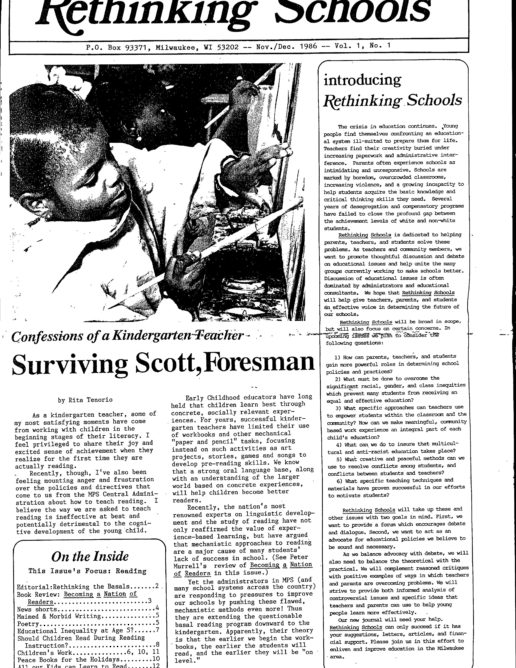Rethinking the Basal Reader
A number of writers in this first issue of Rethinking Schools challenge Milwaukee’s basal reading program, which gives students short, often sanitized reading, selections. They advance compelling arguments in.favor of replacing the basal program with a “trade book” approach which encourages.children to: read and discuss whole books and gives teachers the time and freedom to experiment with creative methods of reading and language arts instruction. As the Scott Foresman basal is evaluated during the next few years, we believe that the validity of using any systemwide basal should be challenged.
The dominance of the basal in Milwaukee and other big city school systems is symptomatic of a disturbing trend within public education — the growing infatuation with commercially produced educational programs which claim to provide all.the materials, and managerial advice needed for achieving almost automatic success in a given subject.
Teaching vs. “System management”
The basal systems offer administrators and teachers that peculiarly American seduction — the promise of an elaborate management system so cleverly designed that it’s bound to succeed if methodically and rigidly implemented. In the context of education, such systems reduce teachers to combination clerk/drill-sergeants. Good teaching has always demanded artistry, imagination, shrewd judgement. But the opportunities to exercise these skills are cut off when the content, sequence, and pacing of the curriculum are dictated by a single textbook company and principals anxious to keep all classes advancing in lockstep formation. Teachers don’t even determine what concepts and comprehension questions to present; it all comes out of the book.
Such systems offer textbook companies the obvious reward of large and long-term profits which flow from school systems that have been hooked.
Administrators gain a somewhat more subtle benefit — the illusion that they have solved a problem by finding the right piece of technology.
“De-skilling” Teachers
Teachers and students, however, do not benefit at all. Some teachers probably appreciate the conveniences of such systems — the ready made lesson plans and tests, the ease with which new students can be plugged into appropriate workbooks and groups. But these conveniences exact a heavy price. They deprive teachers of the chance to truly exercise their craft. Inevitably, their skills atrophy. As Michael Apple has pointed out, teachers become “deskilled” because they don’t have to grapple with the difficult tasks of figuring out what and how to teach. Lively discussions about matters which the teacher and students care about are crowded out by more ritualistic and mechanical activities — answering the skill check and comprehension questions, vocabulary drills, and work on isolated skills. Students experience reading as a drab prelude to equally drab paper and pene-il activities. They come to view books as a source of boredom, rather than as a source of discovery and stimulation.
The attraction of basal programs springs, in part, from a valid desire for a clear set of educational goals which are taught and tested throughout the entire school system, and which are pursued by means of a logical progression of material through advancing grade levels. In the age of commercial standardization and computer worship,perhaps it is not surprising that prepackaged educational systems seem to offer the easiest way to satisfy this need. The practical results of such an approach are dangerous. Rather than helping teachers experiment with and reflect upon different ways of teaching, “systems management” administrators become more concerned with pressuring teachers to stick to rigid schedules and keep their paperwork in order. In Milwaukee’s public elementary schools, this approach has encouraged administrators to deprive teachers of the independence and time they need to teach creatively. It reflects a basic mistrust of the abilities of teachers to solve educational problems and a fear of confronting those problems in any real way. In the name of accountability, teachers are being prevented from doing their jobs well.
“Don’t Mourn, Organize”
Many MRS elementary teachers find the time and energy to go beyond the standardized curriculum. Unfortunately, they receive little praise for their efforts and often have to strain to teach creatively within the constraints of a rigidly uncreative system. The structure of the school system gives teachers little opportunity to collectively reflect upon and attempt to resolve common problems. The only realistic way for MPS elementary teachers to regain the independence they need to teach well is to organize around classroom issues. A good starting point would be a serious effort to question the current MPS basal program. We have an obligation to our students and ourselves to challenge instructional approaches which do not work well. It is high time for the basal system to be arraigned before the court of sound educational practices, with parents, students,,and teachers occupying prominent places in the jurors box.

